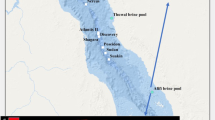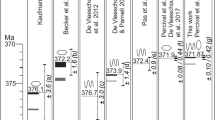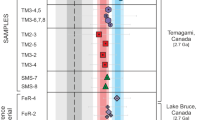Abstract
THE hot brines in the Atlantis II Deep in the Red Sea (Fig. 1) have concentrations of both oxygen- and hydrogen-isotopes which are different from those of the overlying Red Sea deep water but are identical to the surface waters, only at the southern parts of the Red Sea1,2. It was inferred, therefore, that these brines originated in the southern Red Sea and have migrated northwards to their present location. This hypothesis has often been questioned, using mainly geological arguments, the most striking of which is the improbability of a plumbing system which had to work over a distance of more than 800 km (refs 3, 4). However, the geochemical problem of the depletion in heavy isotopes in the hot brines as compared to the directly overlying seawater has still not been solved. We can add new data to this discussion from stable isotope analyses carried out on new brines which were found throughout the Red Sea (Fig. 1). Many of these occurrences are between the Atlantis II Deep and the southern Red Sea5.
This is a preview of subscription content, access via your institution
Access options
Subscribe to this journal
Receive 51 print issues and online access
$199.00 per year
only $3.90 per issue
Buy this article
- Purchase on Springer Link
- Instant access to full article PDF
Prices may be subject to local taxes which are calculated during checkout
Similar content being viewed by others
References
Craig, H. Science 154, 1544 (1966).
Craig, H. in Hot Brines and Recent Heavy Metal Deposits in the Red Sea (eds Degens, E. T. & Ross, D. A.) (Springer, Berlin, 1969).
White, D. E. Econ. Geol. 63, 301 (1968).
Manheim, F. T. Init. Rep. DSDP 23, 975 (1974).
Bäcker, H. & Schoell, M. Nature Phys. Sci. 240, 153 (1972).
Faber, E. Bericht Bundesanstalt für Geowissenschaften (unpublished).
Schoell, M., Bäcker, H. & Baumann, A. in Problems of Ore Deposition, 4th IAGOD Symp. 1, 303 (1974).
Ross, D. A. et al. Science 179, 377 (1973).
Schoell, M. & Risch, H. Geol. Jb. D 17, 15 (1976).
McIntyre et al. Science 191, 1131 (1976).
Deuser, W. G., Ross, E. H. & Waterman, L. S. Science 191, 1168 (1976).
Gonfiantini, R., Borsi, S., Ferrara, G. & Pianchi, C. Earth planet. Sci. Lett. 18, 13 (1973).
Schoell, M. & Faber, E. Geol. Jb. D 17, 197 (1976).
Perry, E. A., Gieskes, J. M. & Lawrence, J. R. Geochim. cosmochim Acta. 40, 413 (1976).
Lawrence, J. R., Gieskes, J. M. & Broecker, W. S. Earth planet Sci. Lett. 27, 1 (1975).
Lawrence, J. R. Init. Rep. DSDP 23, 939 (1974).
Friedman, I. & Hardcastle, K. Init. Rep. DSDP 23, 969 (1974).
Issar, A., Rosenthal, E., Eckstein, Y. & Bogoch, R. Int. Ass. Scient. Hydrol. 16, 39 (1971).
Bäcker, H., Lange, K. & Richter, H. Geol. Jb. Reihe D, Heft 13, 79–123.
Author information
Authors and Affiliations
Rights and permissions
About this article
Cite this article
SCHOELL, M., FABER, E. New isotopic evidence for the origin of Red Sea brines. Nature 275, 436–438 (1978). https://doi.org/10.1038/275436a0
Received:
Accepted:
Published:
Issue Date:
DOI: https://doi.org/10.1038/275436a0
This article is cited by
-
A possible brine supply from the Afar continental endorheic hyper saline lakes to the Red Sea bottom brine pools
Hydrogeology Journal (2018)
-
Hydrothermal fluid migration and brine pool formation in the Red Sea: the Atlantis II Deep
Mineralium Deposita (2016)
-
Numerical modeling of seawater intrusion into endorheic hydrological systems
Hydrogeology Journal (2013)
-
Lead and strontium isotopes in metalliferous and calcareous pelitic sediments of the Red Sea axial trough
Mineralium Deposita (1994)
Comments
By submitting a comment you agree to abide by our Terms and Community Guidelines. If you find something abusive or that does not comply with our terms or guidelines please flag it as inappropriate.



